Your complete guide to Trump’s Jewish advisers and pro-Israel cabinet
Trump’s new cabinet will include Mike Huckabee, Marco Rubio, and other loyalists with strong pro-Israel stances
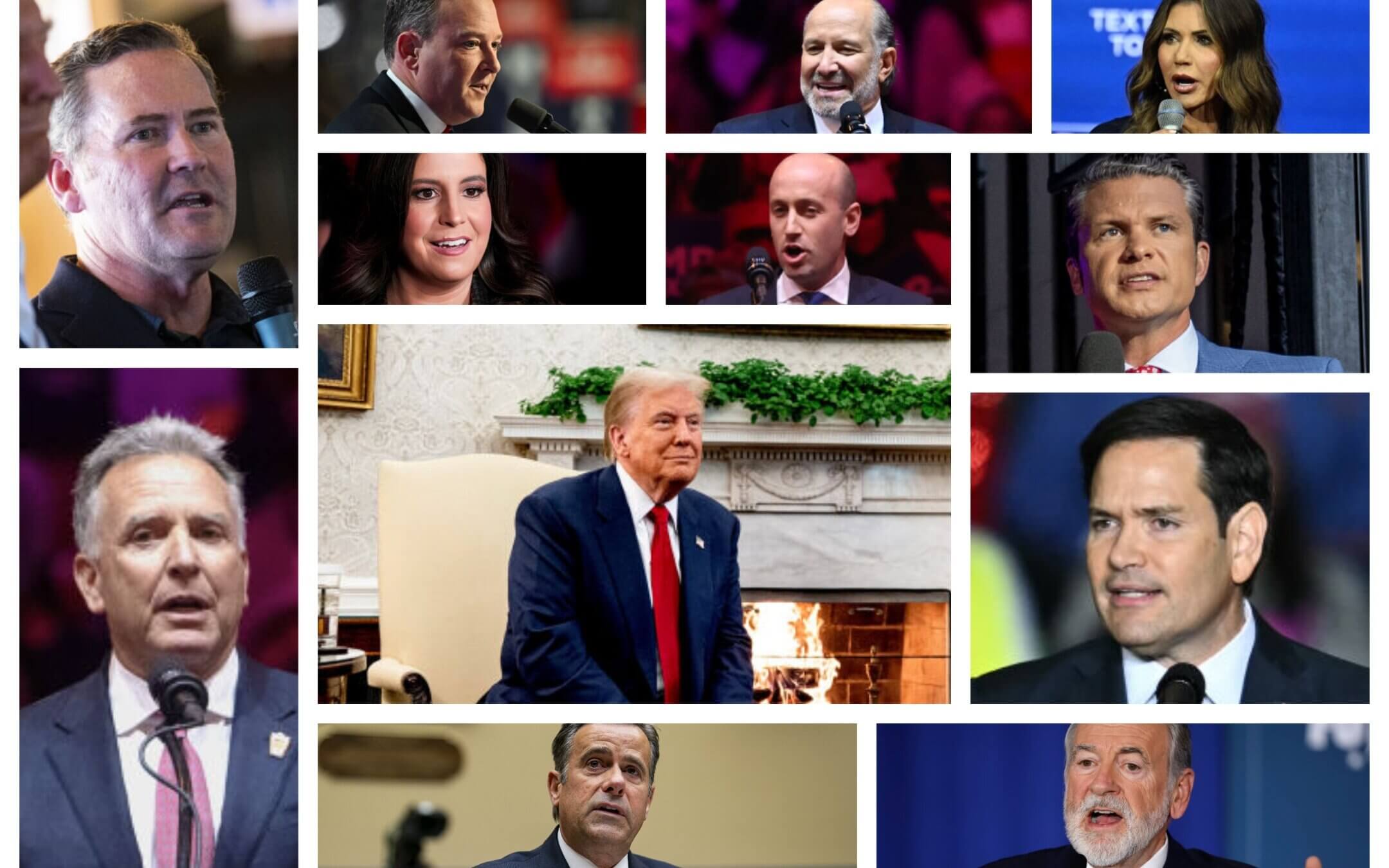
President-elect Donald Trump (center) on Nov. 13, 2024 and his recently announced appointees. Photo by collage photo via Getty Images
President-elect Donald Trump has filled much of his cabinet, rolling out nominations that feature people deeply connected to the Jewish and pro-Israel communities, including Mike Huckabee, Steve Witkoff, and Marco Rubio.
His first national security picks are die-hard Israel supporters, some of whom have denied the existence of the Palestinian people and back the annexation of the occupied West Bank. These loyalists are set to advance his “America First” and hardline populist agenda in a second term. They could signal some shifts in longstanding U.S. policy, especially regarding a possible conflict with Iran and resolving conflicts in the Middle East.
Here’s a running guide to the key players and candidates in Trump’s incoming cabinet and advisory circles related to Jewish and Israel issues.
Marco Rubio, secretary of state
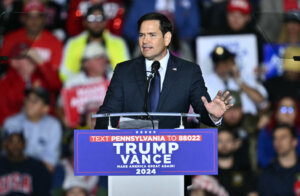
Why Trump picked Rubio: Rubio, vice chair of the Senate Intelligence Committee and a member of the Senate Foreign Relations Committee, has vast national security experience and strong connections to secure a swift Senate confirmation.
What he’s said on Israel: Rubio, 53, has echoed Trump’s “peace through strength” doctrine and call to allow Israel to do what’s needed to defeat Hamas. In a viral video earlier this year, Rubio said he expected Israel “to destroy every element of Hamas.” Rubio likened the Israeli ground operation in Rafah, which was opposed by the Biden administration, to the Allies’ pursuit of Adolf Hitler during the Holocaust.
What he’s said on Iran: Rubio has advocated for reinstating tough economic sanctions on Iran to weaken its terror networks and prevent it from acquiring nuclear weapons.
Relationship with Jews: Norman Braman, an auto dealership magnate and past president of the Greater Miami Jewish Federation, was Rubio’s political patron. Rubio surprised pro-Israel backers with his April vote against emergency funding to Israel because it lacked border enforcement measures. Rubio excused Trump after he repeatedly accused American Jews of disloyalty to Israel and suggested they must hate their religion if they vote for Democrats. And he also angered Orthodox leaders in 2022 for introducing a bill that would make daylight saving time permanent across the nation, which they said would have made it more difficult for people to attend morning prayers and get to work on time.
Pete Hegseth, secretary of defense
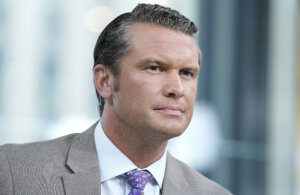
What he’s said on Israel: Hegseth, 44, a Fox News host, provided favorable coverage of Israel on the network and said that his time in the U.S. Army turned him into a supporter of the Jewish state. He interviewed Israeli Prime Minister Benjamin Netanyahu in March and said, “Israel needs our support.” He also ran a three-part series on Fox Nation, “Battle in the Holy Land: Israel at War,” that focused on the war in Gaza and the ongoing Israeli-Palestinian conflict. “There’s no doubt this is a fight that Israel needs to finish,” Hegseth said, echoing Trump’s call for Israel to finish the job and eliminate Hamas.
A hardliner on Iran: Hegseth called for U.S. military action against Iran back in 2020. “I don’t want boots on the ground, I don’t want occupation, I don’t want endless war,” he said on Fox News. “But Iran has been in endless war with us for 40 years. Either we put up and shut up now and stop it, or we kind of wait, go back to the table, and let them dither while they attempt to continue to develop the capabilities to do precisely what they said they want to do.”
Mike Waltz, national security adviser
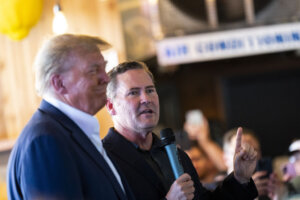
Why it matters: The selection of Rep. Mike Waltz of Florida, a former Green Beret with a staunchly pro-Israel record, to lead the National Security Council signals Trump’s intent to maintain his strong support for Israel in a second term and take a tougher approach toward Iran.
What he’s said on Israel: Waltz, 53, consistently criticized the Biden administration’s foreign policy, describing it as one of “concession and chaos.” He strongly supports Israel’s war in Gaza and praised Israel’s targeting of Hezbollah operatives and elimination of the terror group’s commanding leadership. Even before the war in Gaza, Waltz said the U.S. should allow Israel to strike Iran’s nuclear program. Last month, Waltz recommended that Israel strike Kharg Island, a crucial hub for Iran’s oil exports, and its nuclear facilities at Natanz.
One of his key tasks: Waltz, a staunch advocate for expanding the Abraham Accords, will be playing a central role in talks with Saudi Arabia to advance Trump’s goal of achieving regional peace and resolving the Israeli-Palestinian conflict.
Elise Stefanik, US ambassador to the UN

What it means for Israel: Stefanik, 40, brings her national security experience and a combative, unapologetic style to the United Nations at a critical juncture for Israel and the Middle East. With tensions expected to rise around Iran’s nuclear ambitions and increasing global pressure on resolving the Israeli-Palestinian conflict, Stefanik could position herself as a formidable ally to Israel.
Stefanik recently called to cut off aid for the United Nations Relief and Works Agency for Palestine, the main supplier of humanitarian assistance to Palestinians in Gaza.
Her popularity among conservative Jews: Stefanik gained popularity in the Jewish and pro-Israel community after challenging the presidents of Harvard, MIT, and the University of Pennsylvania on whether calls for the genocide of Jews violate their campus codes of conduct.
Mike Huckabee, US ambassador to Israel
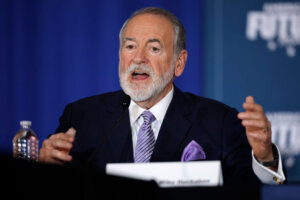
Why he got the job: Huckabee, 69, enjoys the trust of both Trump and Israeli Prime Minister Benjamin Netanyahu. Huckabee, a Baptist minister, has been traveling to Israel since 1973 and says he’s taken more than 100 trips there. A MAGA loyalist, Huckabee is a seasoned advocate for Israeli interests. His influence could bolster Netanyahu’s outreach to U.S. evangelicals, a community Netanyahu has increasingly prioritized over American Jews in recent years.
What he’s said on Israel: Last year, he led a mission of evangelical leaders to Israel following the Oct. 7 attacks. “I came here to say loud and clear that evangelicals stand with Israel,” Huckabee said. In 2008, Huckabee said, “There’s really no such thing as a Palestinian.” During the 2016 Republican presidential primary, Huckabee said he saw the occupied West Bank as an “integral part” of Israel. In 2017, he said, “There is no such thing as a West Bank. It’s Judea and Samaria. There’s no such thing as a settlement.”
A supporter of annexation: In a radio interview following the announcement of his new role, Huckabee said there’s a chance that Israel will be given the green light to annex the occupied West Bank in a second Trump term.
Unconventional pick: The position, traditionally a political appointment, is usually given to Jewish donors, trusted Jewish officials or career diplomats. Huckabee would be the first non-Jewish ambassador since 2011 and the first non-Jewish appointee without diplomatic experience in more than four decades.
Steven Witkoff, special envoy to the Middle East
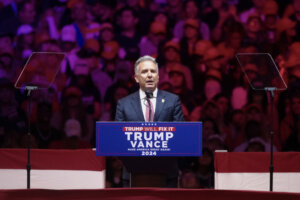
Why he was picked: Witkoff, 67, has no diplomatic experience. However, he has a longstanding trusted relationship with Trump, and with his son-in-law, Jared Kushner, who was instrumental during the first Trump administration in crafting the Trump peace plan and brokering the Abraham Accords.
Like Kushner, Witkoff brings a real estate negotiating approach that Trump values. Witkoff has served as the Trump campaign’s backchannel to the Jewish business community, particularly after President Joe Biden halted the shipment of 2,000-pound weapons to Israel.
Relationship with Israel: Witkoff attended Israeli Prime Minister Benjamin Netanyahu’s address to Congress in July, and found it moving, especially when Netanyahu talked about the hostages in Gaza — some of whom were at the Capitol that day. “It felt spiritual,” Witkoff said on the Fox Business channel the next day, “and yet, that’s not the reaction you sense that you were getting from many of those Democrats.”
Morgan Ortagus, deputy to special envoy to the Middle East

Ortagus, a former evangelical Christian, converted to Judaism in 2007 while working in Iraq for the U.S. Agency for International Development under President George W. Bush. She brings extensive foreign policy expertise to her role as deputy to Steve Witkoff, a real estate investor and Trump’s longtime friend and golfing partner, who does not have a background in diplomacy.
During Trump’s first term, Ortagus was part of the team working on the Abraham Accords, which normalized relations between Israel and four Arab nations. After leaving the State Department in 2021, Ortagus founded Polaris National Security, a nonprofit supporting defense-focused political candidates, and launched an unsuccessful 2022 run for Congress in Tennessee, a campaign Trump endorsed before ballot access issues derailed her candidacy.
Adam Boehler, special presidential envoy for hostage affairs
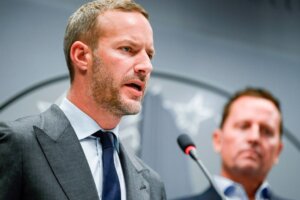
Who he is: Boehler, 45, who is Jewish, was CEO of the U.S. International Development Finance Corporation during the first Trump administration. He served with Jared Kushner, Trump’s son-in-law, on the negotiating team for the Abraham Accords and was the lead negotiator in normalization talks between Israel and Morocco. Bohler and Kushner were summer colleague roommates and worked together on a national coronavirus testing plan.
What it means for Israel: Boehler’s nomination to the role, with the rank of ambassador and requiring Senate confirmation, is a positive sign for the families of Israeli hostages, including the American hostages held by Hamas in Gaza. In past writings and interviews, Boehler said U.S. negotiations to secure the release of American citizens wrongfully detained abroad should be backed by the threat of military action. Earlier this year, he said that the Abraham Accords happened because Trump took a hard stance on Iran. “That is how real peace is achieved in the Middle East, through strength. Now is the time to get tough on Iran and their proxies, especially Hamas.”
Howard Lutnick, secretary of commerce
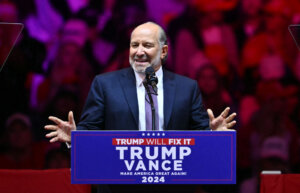
Why he was picked: Lutnick co-leads Trump’s transition team and had been considered for treasury secretary before Trump nominated him to lead the Commerce Department. Lutnick has served as Trump’s most enthusiastic liaison to the business world, promoting the president-elect’s plan to increase tariffs, which many in the business world worry will dampen the economy. Over the course of the election, Lutnick raised $75 million for Trump’s campaign, not including the $10 million he personally donated.
Lutnick gained fame in the days after 9/11, leading Cantor Fitzgerald, the financial services firm that suffered more fatalities than any other business in the terror attack.
Jewish ties: Lutnick has long supported Jewish organizations. Among them: Park Avenue Synagogue and the Synagogue of the Hamptons, where he is an honorary trustee. Lutnick and his wife chaired United Hatzalah’s annual gala in New York this year, the first since Oct. 7, organizers noted, connecting Lutnick’s loss of his brother, friends and employees in the 9/11 terror attack to Hamas’ terror attack on Israel. Last month, he accompanied Trump to the Ohel, where Rabbi Menachem Schneerson, the Lubavitcher Rebbe, is buried; it’s a frequent stop for candidates trying to show respect to the Orthodox Jewish community.
Lee Zeldin, EPA administrator
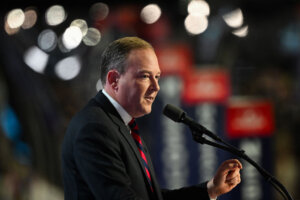
A Jewish MAGA loyalist: Zeldin, 44, has earned Trump’s trust since voting as a congressman against certifying the 2020 election results. During the campaign, Zeldin was a vocal Trump surrogate and critic of anti-Israel sentiment in the Democratic Party. He excused Trump’s remarks saying Jews would be to blame if the former president lost the election, and he accused Pennsylvania Gov. Josh Shapiro of “trying to un-Jewish himself” to become Kamala Harris’ vice presidential pick.
His Jewish background: Zeldin, who is married to a Mormon, leaned into his Jewish background to rally Orthodox voters during his 2022 New York gubernatorial campaign. His great-grandfather Moshe Efraim “Morris” Zeldin, whom Zeldin is named after, was an Orthodox rabbi in Brooklyn and a pioneer in the Zionist movement.
Growing up in Suffolk County on Long Island, Zeldin spent considerable time with his grandfather Bernard Zeldin, who founded the Farmingdale Jewish Center. His mother, Merrill Schwartz, was a fourth grade teacher at a yeshiva in Brooklyn.
Scott Bessent, treasury secretary
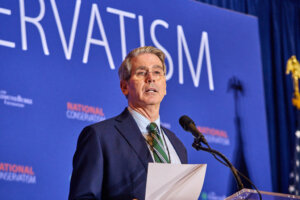
His background: Bessent, 62 is described as a protege of Jewish billionaire George Soros, serving for two decades as management investing chief at the Soros Fund Management. (Trump invoked the Soros-as-puppeteer antisemitic conspiracy in his fundraising emails last year.)
What he said about Iran: The treasury department oversees economic and trade sanctions on Iran and other bad actors.
In a recent interview, Bessent echoed Trump’s “maximum pressure” campaign on Tehran. “I say, let’s make America great again, and let’s make Iran broke again,” he said.
John Ratcliffe, CIA director
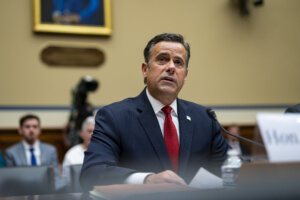
What it means for Israel: Ratcliffe, 59, previously a member of Congress from Texas and former director of national intelligence, accused the Biden administration of diverting critical U.S. intelligence assets from monitoring terrorist groups like Hamas.
During the presidential campaign, he criticized Vice President Kamala Harris for promoting “a false narrative” that portrayed Israel as targeting innocent Palestinians in Gaza. Ratcliffe also supported the 2017 travel ban that restricted immigration from seven predominantly Muslim countries.
What he’s said on Iran: In an interview with Fox News this year, Ratcliffe praised Israeli strikes on Iran, describing them as an example of the “Trump doctrine” of maximum pressure. He suggested that the U.S. should assist Israel in such military actions.
Stephen Miller, deputy chief of staff and homeland security adviser
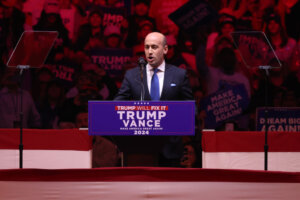
Jewish with strong nationalist views: Miller, 39, declared last month at Trump’s Madison Square Garden rally, “America is for Americans and Americans only.” He was influential in crafting tough immigration policies during Trump’s first term and was the architect behind the policy of separating young children from their undocumented parents. Miller led the implementation of the so-called Muslim travel ban in 2017 and reportedly also hoped to eliminate all refugee admissions to the U.S., dismantling a policy put in place in the wake of the Holocaust.
Condemned by family and classmates: Miller, now tapped for a powerful role within the administration, has been condemned by his Jewish family, descendants of immigrants who fled pogroms, and by his past classmates. His uncle, Dr. David Glosser, a retired neuropsychologist, called him an “immigration hypocrite.” His former rabbi said Trump and Miller’s statements are “echoes of ominous promises that Jews have heard throughout history.”
Pam Bondi, attorney general
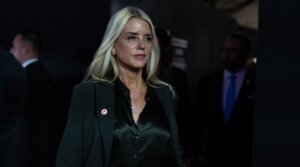
Her background: Bondi, 59, was Florida’s attorney general. In 2019, she joined Ballard Partners, a top Republican lobbying firm. According to news reports, among her clients was the government of Qatar, the Gulf state that has long been a refuge for the leaders of Hamas and was involved in brokering a ceasefire agreement between Hamas and Israel. In 2010, in her race for Florida attorney general, her Jewish opponent, Dan Gelber, accused Bondi of a smear campaign aimed at undermining him among Jewish voters. Bondi repeatedly denied that she was behind the mailer.
What it means for Jews: The Justice Department oversees the prosecution of violent extremism and hate crimes. Bondi called antisemitism “rampant” in the U.S. and said it’s “heartbreaking to see what’s happening to all of our Jewish friends in this country.” In 2017, after a meeting between Trump and state attorney generals regarding a rash of antisemitic incidents and bomb threats on Jewish institutions, Bondi, said, “I know firsthand President Trump cares deeply about our Jewish community and is extremely upset by these attacks.” If confirmed by the Senate, Bondi would succeed Attorney General Merrick Garland, a Jewish former federal judge.
Her views on Israel: Bondi said she had been to Israel “multiple times.” She criticized President Joe Biden for not building on the Abraham Accords. Shortly after Oct. 7, Bondi suggested federal officials get tougher with pro-Palestinian protesters on college campuses and revoke the visas of those who are not U.S. citizens.
Kristi Noem, homeland security
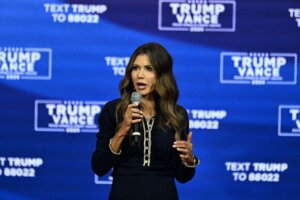
What it means for Jews: The department of homeland security provides resources and guidance to houses of worship to protect themselves under the Nonprofit Security Grant Program. Close collaboration between the agency and Jewish community leaders will be vital to address growing threats and security concerns.
Earlier this year, Noem, 52, serving as governor of South Dakota, signed into law a bill that mandates the use of the controversial International Holocaust Remembrance Alliance definition of antisemitism when investigating allegations of discrimination.
Best known for: Noem gained national attention earlier this year after a revelation in her memoir sparked backlash that derailed her bid to be chosen as Trump’s vice presidential pick. She disclosed that she had shot her hunting dog, an action that stirred controversy, as societal views against cruelty to animals stretch back to the time of the Talmud.
Robert F. Kennedy Jr., department of health and human services
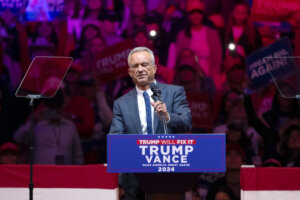
What it means for Jews: The political scion, 70, a vaccine skeptic who referenced Anne Frank at an anti-vaccine rally, has made some bizarre and troubling comments in recent years. He compared vaccine and mask mandates to the Holocaust. He met with Nation of Islam’s Louis Farrakhan in 2015 about measles vaccines. During his 2024 presidential run, RFK Jr. was condemned by major Jewish groups for promoting antisemitic conspiracy theories about COVID-19. He defended his remarks that the pandemic was an “ethnically targeted” bioweapon that spared Ashkenazi Jews, and claimed he has “literally never said an antisemitic word in my life.”
In 2020, Kennedy spoke at a rally organized and attended by antisemitic and neo-Nazi groups. And last year, after critcism, he retracted his praise of former Pink Floyd frontman Roger Waters, who faced backlash for using Holocaust imagery in his concerts.
What he’s said: Kennedy claimed he has “literally never said an antisemitic word in my life” and boasted about spending “a lifetime studying the Holocaust and having “many friends who are Holocaust survivors.”
Jared Isaacman, NASA administrator
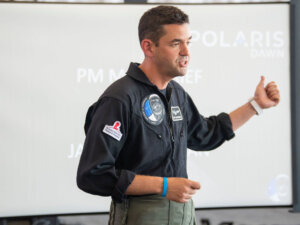
Who he is: Isaacman, 41, a Jewish tech entrepreneur and philanthropist, made history in September as the first astronaut to perform a commercial spacewalk. Born in New Jersey, he set the world speed record in 2009 by flying a jet around the world in less than 62 hours. In 2021, he led the first private human spaceflight, operated by SpaceX.
He told CNN that he would not observe Yom Kippur, the holiest day in the Jewish calendar, that year as it coincided with the launch date. “To be very honest, I’m actually not a religious person,” he said. Accepting his nomination, Isaacman said in a statement that he is “passionate about America leading the most incredible adventure in human history.”
Jewish philanthropy: In 2010, Isaacman used one of his jets to raise funds for Chabad of Hunterdon County, N.J., which was hosting an auction to benefit the organization’s scholarship fund. offered to fly the winner in his high-performance jet, capable of speeds exceeding 8Gs or 80% of the speed of sound — the fastest permissible outside of the military. “The ability to combine having fun and supporting a good cause is a growing trend in fundraising efforts and their success,” Rabbi Eli Kornfeld, executive director of the Chabad of Hunterdon County, said at the time. “People want to enjoy giving back to the community.” This year, he and his father Don, who is on Shift4’s board, were among dozens of people on a gala committee for the local Chabad house.
Daniel Driscoll, army secretary

Why it matters: Driscoll, 37, is a close friend and adviser of Vice President-elect JD Vance and they were classmates at Yale Law School. In contrast to the views of some of Trump’s national security team. Vance is an isolationist and made headlines during the presidential election with his skepticism about American military involvement overseas, including regarding Iran. In the announcement, Trump said Driscoll brings a combination of experiences “to serve as a disruptor and change agent.”
His views on Israel and Iran: Driscoll, who served a 10-month tour in Iraq in 2009, where he led a platoon of Cavalry Scouts, told me during his run for Congress in 2020 that he favored maintaining a U.S. military presence in the Middle East and supports the “maximum pressure” campaign against Iran. “Sometimes you have to punch a bully in the nose,” he said. Driscoll called Trump’s Mideast peace plan at the time a “helpful” basis for negotiations leading to a two-state solution.
Sebastian Gorka, director of counterterrorism at the NSC
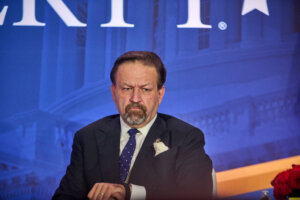
Gorka is a White House adviser in Trump’s first term who once swore his allegiance to a Hungarian neo-Nazi group. In 2022, Gorka called the FBI raid of Trump’s Mar-a-Lago resort in the classified documents case “Gestapo Stasi tactics.”
Earlier this month, Gorka suggested in an interview that there was “no such thing as Palestine.” He also said that Trump’s success in brokering peace is by ignoring the Palestinian Authority, “who are teaching their children that every Jew has to die.”
Gorka declined an interview with the Forward.
Other appointments
► Will Scharf, a former prosecutor and Trump attorney, was appointed White House staff secretary. Scharf, who is Jewish, lost a tense Republican primary race for Missouri attorney general in August.
► Vivek Ramaswamy, 39, a biotech entrepreneur who has never served in public office, was appointed to an outside government entity, called the Department of Government Efficiency, along with Tesla CEO Elon Musk. Ramaswamy has publicly questioned the necessity of continuing U.S. military aid to Israel.
► Katie Miller, the Jewish wife of White House senior advisor Stephen Miller, was named by Trump as a member of DOGE, the informal advisory body. During Trump’s first term, Miller served as press secretary for former Vice President Mike Pence.
► Tulsi Gabbard, an anti-war former Democratic congresswoman who switched to the Republican Party, was nominated for director of national intelligence, raising concerns within the pro-Israel community.
► Charles Kushner, the father-in-law of Ivanka Trump, was nominated as U.S. ambassador to France. Kushner, a convicted felon who received a pardon from Trump at the end of his first term, is likely to play a pivotal role in engaging with the French government. France is a key partner in enforcing the ceasefire in Lebanon and a vital ally in countering Iran’s nuclear ambitions.
► Massad Boulos, the Lebanese American father-in-law of Tiffany Trump who led outreach to Arab-American communities during the election, was appointed as senior adviser on Arab and Middle Eastern affairs.
► David Sacks, a tech entrepreneur who bundled millions for Trump, was tapped as the White House AI & Crypto Czar. Sacks is a longtime friend of Musk.
► Chris Landau, whose father was Jewish and escaped Nazi persecution in 1938, has been nominated as deputy secretary of state. Raised Catholic, Landau shared the story of his father’s flight from Vienna during a 2020 interview. His father later served as an ambassador to several Latin American countries. Landau himself was the U.S. ambassador to Mexico during Trump’s first term and was on the shortlist Supreme Court justice in 2020. “The nomination is a tribute to them,” Landau wrote following Trump’s announcement.
► Stephen Feinberg, a Jewish billionaire investor, was nominated deputy defense secretary. Feinberg is the founder of Cerberus Capital Management, a private investment firm that invested in hypersonic missiles. The number 2 role at the Pentagon requires Senate confirmation.
► Stephen Miran, who was senior adviser for economic policy at the Treasury Department in Trump’s first term, was appointed as chair of the Council of Economic Advisers.
► Boris Epshteyn, a Jewish senior adviser to Trump since 2016, may receive a position. He served as counsel during the hush money trial in New York, and remains in Trump’s inner circle. Epshteyn has reportedly expressed interest in becoming the special envoy for the Russia-Ukraine conflict. Epshteyn, a Russian immigrant, told Trump he had family members on both sides of the ongoing conflict.
► Rick Grenell, former ambassador to Germany who also served as acting director of national intelligence toward the end of Trump’s first term, will serve as Trump’s envoy for special missions. In his announcement, Trump mentioned countries like Venezuela and North Korea, not Iran or Russia. Grenell was on the shortlist for secretary of state. He was a key figure in advancing sanctions against Iran and the normalization of relations between Israel and the United Arab Emirates. Grenell was instrumental in Trump’s outreach to Arab American and Muslim voters in Michigan during the presidential campaign.
► Kevin Warsh, an economic policy adviser during the George W. Bush administration and a former Federal Reserve Board member, was a treasury secretary finalist. The Wall Street Journal reported that Trump is also considering Warsh for the powerful chair of the Federal Reserve in 2026. Warsh is the son-in-law of Ronald Lauder, the cosmetics heir and president of the World Jewish Congress, who was a whisperer to Trump during his first term.
► Marc Rowan, CEO of Apollo Global Management, is a candidate for a top economic role.
Outside Jewish advisers and people with access
► Jared Kushner, Trump’s son-in-law and former Middle East adviser, who said earlier this year he would not return to the White House, is involved behind the scenes and could be a key player in a potential normalization deal between Saudi Arabia and Israel.
► David Friedman, Trump’s first ambassador to Israel, is interested in returning to a national security position to influence Middle East policy and advance a pro-settlement agenda.
► John Paulson, a financier and supporter of Trump, removed himself from consideration for treasury due to financial obligations.
► Steve Schwarzman, Blackstone CEO, will be an influential voice on antitrust rules and trade policy. He is offering recommendations for administration roles.
► Wayne Berman, head of global government affairs for Blackstone and a Republican Jewish Coalition board member, has been suggested by some for deputy secretary of treasury.
► Miriam Adelson is the widow of casino magnate and GOP megadonor Sheldon Adelson, who spent more than $100 million for Trump and made several joint appearances with him.
► Matt Brooks, CEO of the Republican Jewish Coalition, who spent $15 million in Jewish voter outreach and increased Jewish support for Trump and the GOP.
► Elan Carr, CEO of the Israeli American Council, served as the antisemitism envoy in Trump’s first term.
► Jeff Miller of Miller Strategies was one of Trump’s top fundraisers.
► Arthur Schwartz, described as a behind-the-scenes operator and longtime political adviser to Donald Trump Jr., is also close to Vice President-elect JD Vance.
► Bill Ackman, a hedge fund billionaire, has been highly critical of the pro-Palestinian protest movement at Harvard and the university leadership’s response to antisemitism. He has also been outspoken against diversity, equity and inclusion initiatives.
► Ike Perlmutter, a former Marvel mogul, is a Mar-a-Lago member who influenced policy at the department of veterans affairs in Trump’s first term.
► Steve Wynn, a Vegas casino mogul, is a longtime Trump friend who warned him about being off message during the campaign.
► Paul Packer, who chaired the commission of the preservation of America’s heritage abroad in Trump’s first term, was co-chair of the Trump campaign’s Jewish Leadership Coalition, a fundraising group.
► Bruce Blakeman, Nassau County’s first Jewish executive and a close Trump ally, is in consideration for an administration job.
► Sid Rosenberg, a conservative New York-based radio host, was one of Trump’s most aggressive Jewish surrogates.
► Yehuda Kaploun worked with the Trump campaign on outreach to Orthodox leaders.
► Laura Loomer, the conspiracy theorist and provocateur who flew with Trump and appeared with him in September, uses her Jewishness to attack opponents.
Other influencers within Trump’s close circle who have promoted antisemitic tropes and are associated with white nationalists include former Fox News host Tucker Carlson, Steve Bannon and Charlie Kirk.
This post has been updated to add additional entries and details.






















